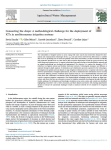Daudin K., Belaud G., Leauthaud C., Bouzidi Z., Lejars C. (2025). Connecting the drops: a methodological challenge for the deployment of ICTs in mediterranean irrigation systems. Agricultural Water Management, 30/06/2025, vol. 315, p. 109545.
https://doi.org/10.1016/j.agwat.2025.109545
https://doi.org/10.1016/j.agwat.2025.109545
| Titre : | Connecting the drops: a methodological challenge for the deployment of ICTs in mediterranean irrigation systems (2025) |
| Auteurs : | K. Daudin ; G. Belaud ; C. Leauthaud ; Z. Bouzidi ; C. Lejars |
| Type de document : | Article |
| Dans : | Agricultural Water Management (vol. 315, June 2025) |
| Article en page(s) : | p. 109545 |
| Langues : | Anglais |
| Langues du résumé : | Anglais |
| Catégories : |
Catégories principales 07 - ENVIRONNEMENT ; 7.3 - Eau. Gestion de l'EauThésaurus IAMM METHODE D'IRRIGATION ; TECHNOLOGIE DE L'INFORMATION ET DE LA COMMUNICATION ; GESTION DES EAUX ; EAU D'IRRIGATION ; REGION MEDITERRANEENNE |
| Résumé : | The vulnerability of irrigated systems in areas coping with water scarcity has boosted the demand for information and communication technologies (ICTs), e.g. tools and services derived from field sensors or satellite data. ICTs are promising tools to track and quantify water flows and transfers, yet their increased accessibility and production benefits does not often lead to their increased deployment beyond the group involved in the initial design and testing process. To support technological innovation scaling, an interdisciplinary approach and an original methodology are developed and implemented. The objective is to explore the dynamics of ICTs initiatives in irrigation systems and facilitate horizontal outreach. Technological emergence and diffusion is captured through in-depth analyses of information and collaboration processes operated by the technologies. Investigation into global and local datasets to map irrigation technical layouts at a regional scale shows a gap between representations of irrigation phenomenon, but used in combination these information sources can help characterize diffusion potential. Feedbacks from empirical works in a set of multistakeholder innovation platforms show that collaborative mechanisms during technological experimentations can be diverse but remain crucial to empower irrigation communities. This methodological investigation fuels the debate on digital agriculture, and shows that there are alternative avenues for irrigation sustainable development through technology. Finally, pathways for information and knowledge circulation across actors, scales, and contexts are identified, highlighting researchers' role to collect, document, and share datasets and stories. Still, learning opportunities should not obscure the operational challenges towards a translocal network of ICTs initiatives for irrigation systems. |
| Cote : | En ligne |
| URL / DOI : | https://doi.org/10.1016/j.agwat.2025.109545 |







